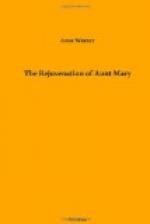That tear upon which Aunt Mary’s nephew went was something lurid and awful. It lasted until Monday, and then its owner returned to college, as ill of body and as embittered of spirit as it was in him to be. The lightsome devil who had ruled him up to his meeting with Mrs. Rosscott resumed its sway with terrible force. The authorities showed a tendency to patience because young Denham had appeared to reform lately and had been working hard; but young Denham felt no thankful sentiments for their leniency, and proved his position shortly.
There was a man named Tweedwell whom circumstances threw directly in the path of destruction. Tweedwell was an inoffensive mortal who was studying for the ministry. He was progressive in his ideas, and believed that a clergyman, to hold a great influence, should know his world. He thought that knowledge of the world was to be gained by skirting the outside edge of every species of worldliness. The result of this course of action was not what it should have been, for Tweedwell was an easy mark for all who wanted fun, and the consciousness of his innocence so little accelerated the pace at which he got out of the way that he was always being called to account for what he hadn’t done.
The Saturday night after his Saturday in town, Jack concocted a piece of deviltry which was as dangerous as it was foolish. The result was that an explosion took place, and the author of the gun-powder plot had all the skin on both hands blistered. Burnett, in escaping, fell and broke his collarbone and two ribs. The house in which the affair took place caught fire, and was badly damaged. And Tweedwell was arrested on the strongest kind of circumstantial evidence, and had to answer for the whole. Naturally, in the investigation that followed, the two who were guilty had to confess or see the candidate for the ministry disgraced forever.
The result of their confession was that Burnett’s father, a jovial, peppery old gentleman—we all know the kind—lost his patience and wrote his son that he’d better not come home again that year. But Aunt Mary lost her temper much more completely and the result, as affecting Jack, was awful.
She might not have acted as she did had the disastrous news arrived either a week later or a week earlier; but it came just in the middle of a discouraging ten days’ downpour, which had caused a dam to break and a chain of valuable cranberry bogs to be drowned out for that year. The cranberry bogs were especially dear to their owner’s heart.
“Why can’t they drain ’em?” she had asked Lucinda, who was particularly nutcracker-like in appearance since her quarantine episode.
“’Pears like they’re lower’n everywhere else,” Lucinda answered, her words sounding as if she had sharpened them on a grindstone.
Aunt Mary bit her lip and frowned at the rain. She felt mad all the way through, and longed to take it out on someone.




